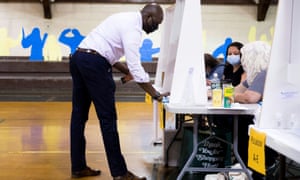The fight to vote
US elections 2020
Seven states and the District of Columbia are holding elections Tuesday in the most widespread trial yet of whether it can be done safely
- George Floyd killing – latest US updates
- See all our George Floyd coverage

Photograph: Rachel Wisniewski/Reuters
Seven states and Washington DC are holding primaries on Tuesday in the most widespread trial yet over whether America can safely hold an election amid the pandemic and unrest as days of protest over the police killings of African Americans continues.
Election officials, who have been encouraging people to vote by mail, already faced an enormous challenge in providing access to voting while protecting public health against Covid-19. Now, they face an additional challenge of conducting an election that guarantees people can vote without risking their physical safety and without police intimidation as curfews clash with voting hours.
One of the most closely-watched states on Tuesday is Pennsylvania, a battleground state, where lawmakers are already seeing an unprecedented flood of requests for mail-in ballots. More than 1.8 million people have requested an absentee ballot so far; during the 2016 primary, just 84,000 people voted by mail. But some voters are still expected to cast a ballot in person, as well.
Pennsylvania law requires voters to return their mail-in ballots to the polls by 8pm on election day. But on Monday evening Pennsylvania’s governor, Tom Wolf, a Democrat, extended the deadline for voters in six counties in the state to return their ballots, saying they could be counted if they were received in the next week and postmarked by Tuesday.
That came after concern that some voters in the state may be disenfranchised because officials couldn’t get them ballots in time. In Delaware county, just outside of Philadelphia, elections officials said Monday they were mailing 6,000 ballots, the day before the election. The county conceded there were 400 ballots that won’t be mailed “due to timing and staffing constraints”.
In Philadelphia and Pittsburgh, election officials have severely limited in-person voting locations because of the coronavirus pandemic. In Philadelphia, officials are monitoring whether they will have to change any of those few locations because of the recent protests, according to the Philadelphia Inquirer. At at least one voting location in Philadelphia, there were long lines this morning as poll workers set up voting machines.
Jonathan Lai 🙊 賴柏羽
(@Elaijuh)Lee Griffith, 35, is furious. He was second in line and waited for 45 minutes to vote. Inside, he said, the poll workers didn’t know what they were doing. He described confusion over poll books, voting machines. pic.twitter.com/PFjDzMVoWp
June 2, 2020
It is unclear how the increased police presence from the protests will mesh with established polling place hours. In Washington DC, Mayor Muriel Bowser announced a 7pm curfew for Tuesday, but polls will be open until 8pm. In Philadelphia, there has been a 6pm curfew, and polls will be open until 8pm. Larry Krasner, the Philadelphia district attorney, said Monday no one will be arrested for going to vote in violation of the curfew.
“Imposing a 6pm curfew on election day threatens to disenfranchise the very people marching to be heard, along with all Philadelphians,” said Quentin Palfrey, chair of Voter Protection Corps, a voting advocacy group. “We applaud district attorney Krasner’s clear statement that no voter will be arrested or prosecuted for going to vote, but no such assurances can overcome the suppressive impact of the curfew.”
In addition to Washington DC and Pennsylvania, Tuesday is primary day in Indiana, Maryland, Montana, New Mexico, Rhode Island and South Dakota.



